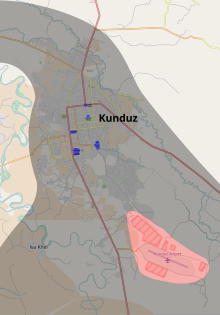
Back معركة قندوز Arabic قوندوز دؤیوشو AZB Schlacht um Kundus German Batalla de Kunduz Spanish جنگ قندوز Persian Bataille de Kunduz (2015) French クンドゥーズの戦い (2015年) Japanese د کندوز د ٢٠١٥م کال جگړه Pashto/Pushto Batalha de Kunduz (2015) Portuguese Kunduz Muharebesi Turkish
| Battle of Kunduz | |||||||
|---|---|---|---|---|---|---|---|
| Part of the War in Afghanistan (2001–2021) | |||||||
 Situation on 27 September, after the Taliban had pushed ANA forces back to the airport. Controlled by the Afghan National Security Forces
| |||||||
| |||||||
| Belligerents | |||||||
|
Supported by: |
| ||||||
| Commanders and leaders | |||||||
|
(President of Afghanistan) (Acting Defense Minister) (Chief of the General Staff of the Afghan Armed Forces) |
(Deputy leader)[2] (Disputed)[4] (Shadow governor of Kunduz) | ||||||
| Strength | |||||||
| 5,000–7,000+[5][6] | 1,500[7] (~500 in initial seizure of Kunduz) | ||||||
| Casualties and losses | |||||||
| Undisclosed[8] | 80–200 killed (Afghan government claim; denied by Taliban)[3][9][10] | ||||||
|
Killed or Wounded: 848+ civilians (U.N. report)[11] 100,000 displaced (over entire offensive) | |||||||
Kunduz within Afghanistan | |||||||
The Battle of Kunduz took place from April to October 2015 for control of the city of Kunduz, located in northern Afghanistan, with Taliban fighters attempting to seize the city and displace Afghan security forces. On 28 September 2015, the Taliban forces suddenly overran the city, with government forces retreating outside the city. The capture marked the first time since 2001 that the Taliban had taken control of a major city in Afghanistan.[12] The Afghan government claimed to have largely recaptured Kunduz by 1 October 2015 in a counterattack, although local sources in the city disputed the claim made by government officials.[13][14]
Twelve hospital staff of Médecins Sans Frontières (Doctors Without Borders) and ten patients, including three children, were killed on October 3 by a prolonged series of US airstrikes on Kunduz Trauma Centre, an emergency trauma hospital run by the agency.[15] Thirty-seven people were injured including nineteen staff members.[16]
- ^ Armstrong, Paul (14 October 2015). "Taliban exit Afghan city of Kunduz but claims mission was success". CNN. Retrieved 18 December 2022.
- ^ "Taliban emir seeks to reassure residents of Kunduz". The Long War Journal. Retrieved 30 September 2015.
- ^ a b "Afghan Forces Make Little Progress in Retaking Kunduz". Bloomberg. 28 September 2015. Retrieved 30 September 2015.
- ^ "Taliban shadow governor for Kunduz denies reports of his death". The Long War Journal. Retrieved 1 October 2015.
- ^ "Taliban Takeover In Kunduz Echoes Islamic State Rout Of Mosul". NDTV. 30 September 2015. Retrieved 1 October 2015.
- ^ "Shaken by Taliban Victory in Kunduz, Afghans Flee Another Provincial Capital". New York Times. 30 September 2015. Retrieved 1 October 2015.
- ^ "Taliban vow to march on Kabulafter winning fight for key city". The Times. London. 30 September 2015.
- ^ "U.S. advisers fought alongside Afghans in retaking Kunduz from Taliban". CBC. 1 October 2015. Retrieved 3 October 2015.
- ^ "Taliban Kunduz attack: Afghan forces claim control of city". BBC. 1 October 2015. Retrieved 3 October 2015.
- ^ "AP Exclusive: Taliban Leader Says Afghan Insurgency Strong". ABC News. Associated Press. 2 October 2015. Retrieved 3 October 2015.
- ^ "At least 848 Afghan civilian casualties in Kunduz: U.N." Reuters. 12 December 2015. Retrieved 22 December 2015.
- ^ Cite error: The named reference
nyt septemberwas invoked but never defined (see the help page). - ^ "Afghan forces 'regain Kunduz control'". BBC News. 1 October 2015. Retrieved 1 October 2015.
- ^ Rubin, Alissa J. (1 October 2015). "Afghan Forces Rally in Kunduz, but Fight Is Far From Decided". The New York Times. Retrieved 2 October 2015.
- ^ Stokes, Christopher (4 October 2015). "Death toll rises" (Press release). Médecins Sans Frontières.
- ^ Cite error: The named reference
MSFwas invoked but never defined (see the help page).
